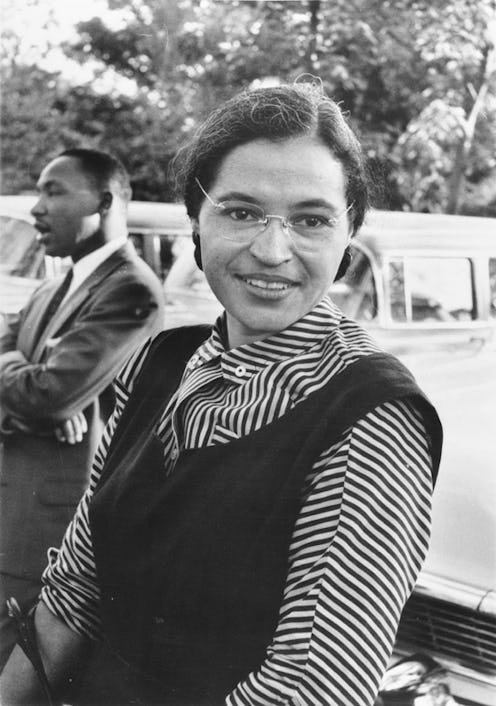
Tuesday marks the 60th anniversary of the 1955 Montgomery Bus Boycott and Rosa Parks' notable quotes illustrate the bravery behind the Civil Rights Movement. Parks' refusal to move to the back of the bus after a white man boarded inspired the Alabama boycott, which was led by Martin Luther King Jr., lasted 381 days, and played a large role in foregrounding the Civil Rights movement.
Time for a quick history lesson: In 1954, the U.S. Supreme Court took a huge step by ruling that "separate educational facilities are inherently unequal" in Brown v. Board of Education. The ruling's implications extended to segregation in all public facilities but was not effectively implemented, especially in southern states like Alabama. After Parks was jailed, the black community refused to utilize public transportation and organized a carpool system that financially affected the public bus system, leading to another Supreme Court ruling that desegregated buses. And that was just the beginning. Parks sparked the boycott but was eventually forced to leave Montgomery after she and her husband were fired after her arrest. She recounts in her autobiography, My Story, the day that started it all.
I was not tired physically, or no more tired than I usually was at the end of a working day. I was not old, although some people have an image of me as being old then. I was 42. No, the only tired I was, was tired of giving in.
Four other black women actually preceded Parks in their refusal to give up their seats on the bus. Each woman, including Parks, went on to speak in the Supreme Court case that eventually led to the desegregation of buses. Parks continued to work with the NAACP and further equal rights, leaving behind a lasting legacy that we remember today. These quotes remind us of the heart and dedication behind efforts to achieve equality. Although it is most definitely more prevalent today than 60 years ago, the United States still has a long way to go.
1) "I would like to be remembered as a person who wanted to be free... so other people would be also free."
Parks was one of the subjects of the 1987 PBS documentary Eyes on the Prize that outlines the American Civil Rights Movement in 14 hours. In it, she describes in detail her encounter with the policeman who arrested her.
2) "Differences of race, nationality or religion should not be used to deny any human being citizenship rights or privileges. Life is to be lived to its fullest so that death is just another chapter. Memories of our lives, of our works and our deeds will continue in others."
She wrote a touching piece on the meaning of life in a December 1988 edition of LIFE magazine.
3) "Whatever my individual desires were to be free, I was not alone. There were many others who felt the same way."
Parks was featured in a book called Refuse to Stand Silently, which recounted the oral history of the social rights movement.
4) "At the time I was arrested I had no idea it would turn into this. It was just a day like any other day. The only thing that made it significant was that the masses of the people joined in."
Three decades later, Parks said she wouldn't have guessed her actions would spark a successful boycott.
5) "I believe we are here on the planet Earth to live, grow up and do what we can to make this world a better place for all people to enjoy freedom."
That 1988 LIFE magazine edition is full of Rosa Parks wisdom.
6) "Racism is still with us. But it is up to us to prepare our children for what they have to meet, and, hopefully, we shall overcome."
Washington Post columnist Courtland Milloy recalls a conversation he had with Parks at a celebration of her life in 1998 at Howard University.
7) "I have learned over the years that when one's mind is made up, this diminishes fear; knowing what must be done does away with fear."
Parks authored her own book alongside Gregory Reed in 2000 called Quiet Strength: The Faith, the Hope, and the Heart of a Woman Who Changed a Nation.
8) "No."
Her famous response to the police officer, who demanded she move from her seat, that made history.